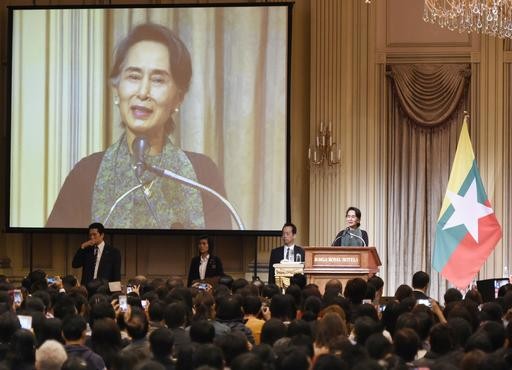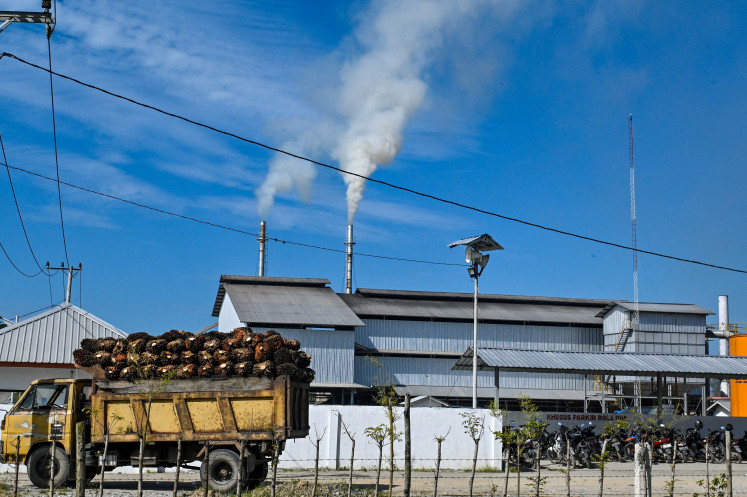Popular Reads
Top Results
Can't find what you're looking for?
View all search resultsPopular Reads
Top Results
Can't find what you're looking for?
View all search resultsAung San Suu Kyi: Powerless for the Rohingyas
Change text size
Gift Premium Articles
to Anyone
C
hampioned as an icon for human rights, she languished in house arrest. World leaders and people all over called for her release while she stayed confined by the military junta for around 15 years in her own country.
She is now free.
And now, Aung San Suu Kyi chooses silence over a moral position while atrocities of the worst kind continue in her own country. She has become a glaring example of how a once human rights defender can become a reticent witness of human rights violation of one of the “most persecuted people in the world.”
She is the unquestioned leader of the party that is running Myanmar since last year. Her long struggle for democracy and human rights was supposed to be her schooling on how to run her country.
Yet the appalling truth is she has been accused by world human rights leaders of not protecting Rohingya Muslims in her country and of potentially “legitimizing genocide” according to a report of the Independent, a UK daily.
Military operations in the Rakhine State have caused thousands of Rohingyas to flee across the border to Bangladesh. Soldiers have allegedly killed children, innocent people and raped women in their brutal crackdown on the Rohingyas.
Aid workers and the media are prohibited to visit the affected areas, apparently to hide the brutality being carried out.
UNICEF has warned that thousands of malnourished children are suffering from lack of medical care and in danger of starving.
The horrific situation prompted John McKissick, head of the United Nations refugee agency in the Bangladeshi border town of Cox's Bazar to conclude that "Rohingya Muslims in Burma are being ethnically cleansed."
All those heinous crimes are being committed by troops within a year of Suu Kyi leading her National League for Democracy (NLD) party to power by winning Myanmar's first openly contested election in 25 years in November 2015.
Suu Kyi's unwillingness to do the right thing for the Rohingya “is baffling to an international audience that persists in casting her as a human rights icon," said David Mathieson of Human Rights Watch.
But only a few years ago, she was portrayed in a different way. She had a formidable reputation worldwide.
For her non-violent struggle for democracy and human rights, she was given the Nobel Peace Prize and a number of other prestigious awards.
While awarding the Nobel Peace Prize in 1991, the Norwegian Nobel Committee portrayed her as a model "for many people throughout the world who are striving to attain democracy, human rights and ethnic conciliation by peaceful means."
The Nobel Committee chief called her "an outstanding example of the power of the powerless."
When European Parliament gave Suu Kyi the Sakharov Prize in 2013, it called her a "great symbol of freedom and democracy." She was awarded the prize in 1990 when she was kept under house arrest by Myanmar military junta.
The Sakharov Prize for Freedom of Thought, commonly known as the Sakharov Prize, honors individuals and groups of people who have dedicated their lives to the defense of human rights and freedom of thought.
In 2000, Suu Kyi was also given in absentia the Presidential Medal of Freedom — the highest civilian award of the United States for her contribution to world peace and culture.
Most of her international honors were awarded during her confinement.
She spent much of her time between 1989 and 2010 in some form of detention because of her efforts to bring democracy to military-ruled Myanmar — a fact that made her an international symbol of peaceful resistance in the face of oppression. She has spent 15 of the last 21 years under house arrest.
She was finally released from house arrest in November 2010. After her release, she pledged to keep working towards restoring democracy and improving human rights in Myanmar.
But the brutality by her government's army on hapless Rohingyas following the Oct. 9 militant attack on a security post has put to question Suu Kyi's commitments to democracy and human rights.
Her non-action and reticence against atrocities have made it evident that she has forgotten her promise to democracy and human rights.
Not only does she remain silent against the atrocities, she also defends her government's actions by referring to Rohingyas as "Bengalis" and arguing that her government's response to the Oct. 9 attack is based on the "rule of law."
Her position is in line with the one of the Myanmar military junta who in the past brutally persecuted Rohingyas on many occasions during their rule of around 50 years. The junta denied Rohingyas citizenship.
Suu Kyi is barred from the presidency by the junta-drafted constitution, but she is leading the country as state counsellor. For power, it seems, she refrains from confronting the military junta who still holds important portfolios like border security, home, and defence ministries.
It is now difficult to find all those inspiring characteristics in her leadership. The Noble Peace Prize Committee and the European Parliament termed her "great symbol of freedom and democracy" and "an outstanding example of the power of the powerless." But that shine has apparently left her at this moment of crisis of the Rohingyas.
This article appeared on The Daily Star newspaper website, which is a member of Asia News Network and a media partner of The Jakarta Post







